Vocabulary: Glimpses of the Past | English Class 8 PDF Download
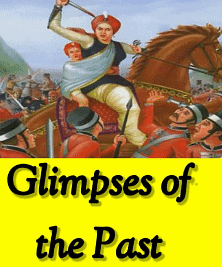
1. The Martyrs
(At Delhi. Lata Mangeshkar can be seen singing a song. Pandit Jawaharlal Nehru, Lal Bahadur Shastri, and Indira Gandhi can be seen sitting beside her)Narrator: At a function in Delhi.
Lata Mangeshkar (singing a song): "Oh my countrymen! Let your eyes fill with tears, as you recall the sacrificesof India’s martyrs."
Meaning of Difficult Words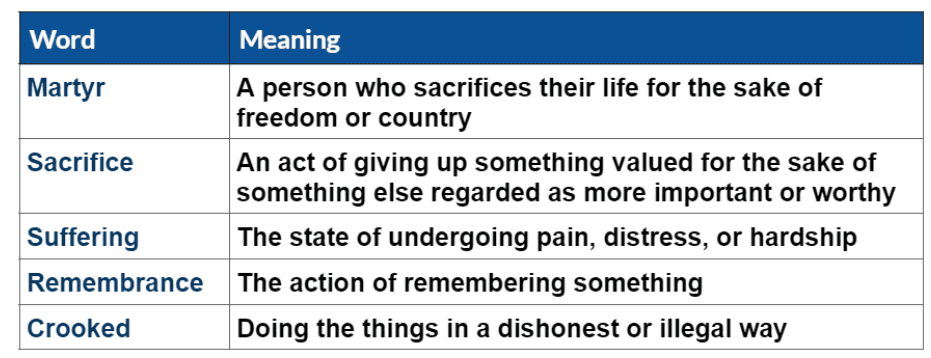
2. The Company’s conquests (1757-1849)
(Scene 1:A Map of India)Narrator: With its superior weapons, the British East India Company was extending its power in 18th century India.
(Scene 2: Inside a palace)
Narrator: Indian princes were short-sighted.
Indian princes:That upstart Rajah Bah! Call the English merchants. They will help me to defeat him.
Narrator:The people had no peace due to such constant fights.
(Scene 3:At war)
(Scene 4: Sacrifice of Tipu Sultan)
Meaning of Difficult Words

Scene 5-6
Narrator: How did Indians react to these conquests? (People with varied opinions can be seen discussing the conquests of Britishers)(Scene 5: Three royal men can be seen discussing inside a palace)
Royal man 1: Thank God, there is peace in the country now! No more wars and no looting by thugs!
Royal man 2:It is God who sent the British!
Royal man 3: Our destiny is linked with them!
(Scene 6: Four common people can be seen reacting to the conquest of Britishers)
Man 1:The white man has killed or dethroned our kings.
Man 2: Some kings were not good, but after all, they were of this land.
Man 3: Now we have become slaves of foreigners!
Meaning of Difficult Words
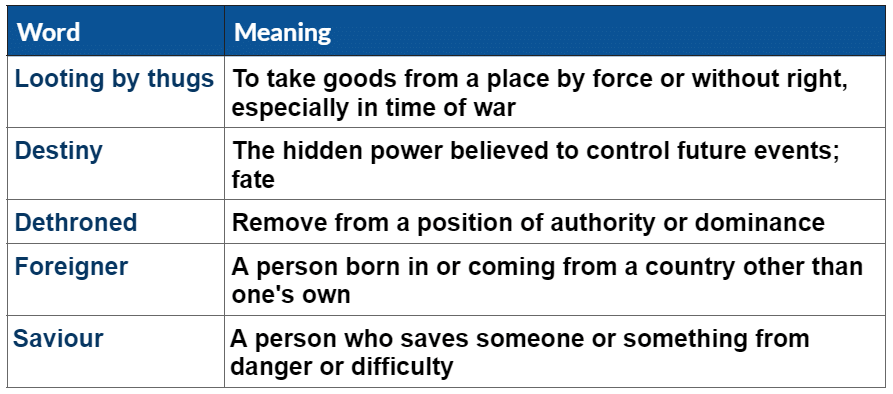
3. British Rule (1765-1836)
(Scene 1-2: Religious leaders can be seen speaking to a crowd of people)
Narrator: Religious leaders preached ideas like untouchability and child marriage.
Religious leader 1: Anyone who crosses the seas loses his religion.
Religious leader 2: All the misery in the world is due to women.
(Scene 3: Britishers can be seen having conversations with each other)
Narrator: The truth was that Indians had lost self-respect. The British scorned them.
British man 1 (addressing to another English man): The natives are unworthy of trust, incapable of honesty–
Indian man: True, your honour, but I am honest.
(Scene 4: A British man speaks to a poor farmer)
Narrator: Being merchants, the British wanted quick profits, their heavy taxes forced farmers to abandon their fields.
Farmer: But your men are taking all my crop!
(Scene 5: The Britishers can be seen discussing to each other)
Narrator: Still, the British invented other methods which gave them more profits.
British man 1: The goods manufactured in England should not have any import duty when brought into India.
British man 2: A good idea!
Narrator: The East India Company’s laws began to cripple Indian industries.
(Scene 6: Starvation of Indians)
Narrator: Inevitably famines followed. Between 1822 and 1836 fifteen lakh Indians died of starvation.
Narrator: The British policies ruined the expert artisans and their business.
Meaning of Difficult Words
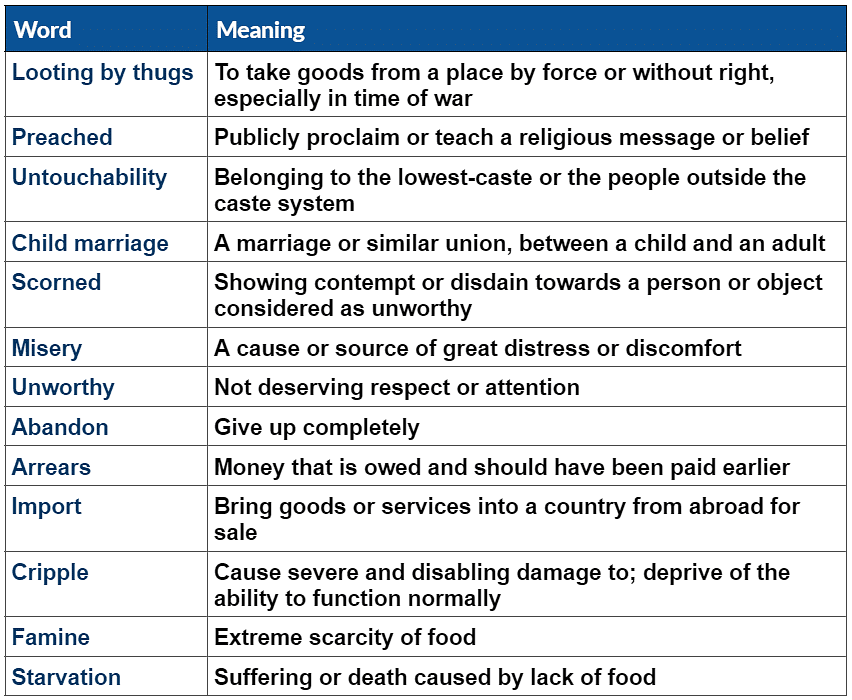
4. Raja Ram Mohan Roy (1772-1833)
(Scene 1: Raja Ram Mohan Roy's conversation with a political member)(Scene 2: At Roy's house)
(Scene 3: Roy's meeting with common people)
(Scene 4: In England)
Meaning of Difficult Words
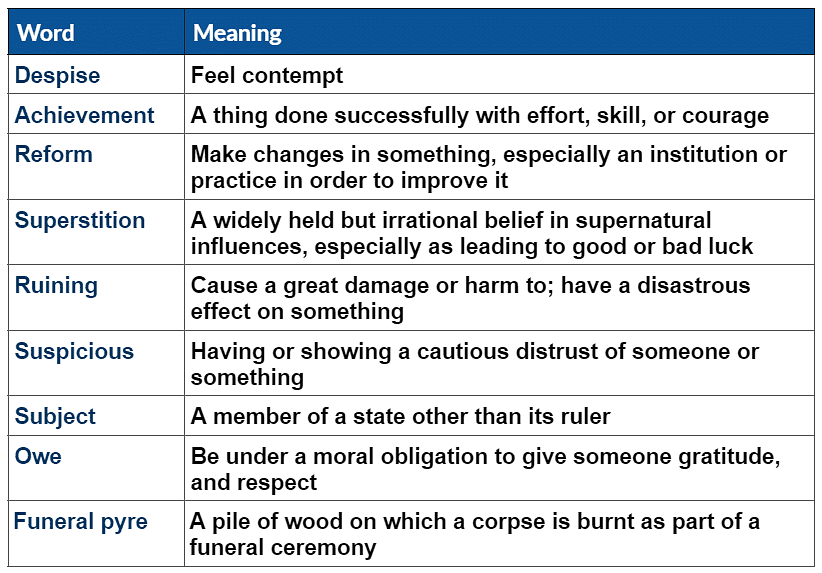
5. Oppression (1765-1835)
(Scene 1: Indians at jail)(Scene 2: Three Britishmen can be seen enjoying their party)
(Scene 3: Exporting goods)
Meaning of Difficult Words
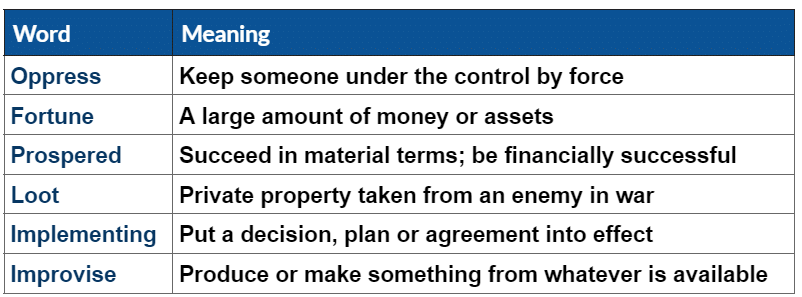
6. Dissatisfaction (1835-56)
(Scene 1: Macaulay and Bentinck can be seen having a conversation with each other)(Scene 2: Common people having conversation with each other)
(Scene 3: A Map of India- 1856)
(Scene 4: Several people can be seen sitting under a tree and discussing how to drive the Britishers out)
Meaning of Difficult Words
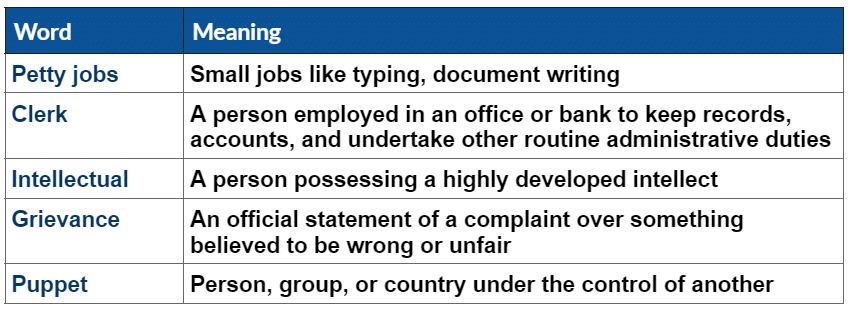
7. The Sparks (1855-57)
(Scene 1: A terrific war)(Scene 2: Soldiers can be seen talking to each other)
(Scene 3: Sepoys revolted against the Europeans)
(Scene 4: Three men can be seen having conversation with each other)
(Scene 5: People were sending chapaties from one village to another village)
(Scene 6: Indian soldiers circulates lotus flowers)
Meaning of Difficult Words
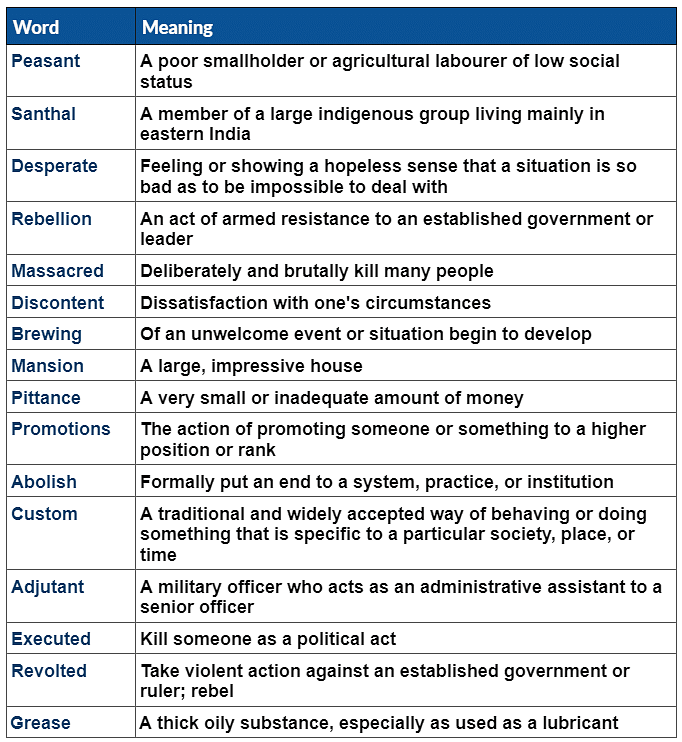
8. Revolt (1857)
(Scene 1: War at Meerut)(Scene 2: At Delhi)
(Scene 3: A war spread wider)
(Scene 4: A few men can be seen talking to each other)
Meaning of Difficult Words
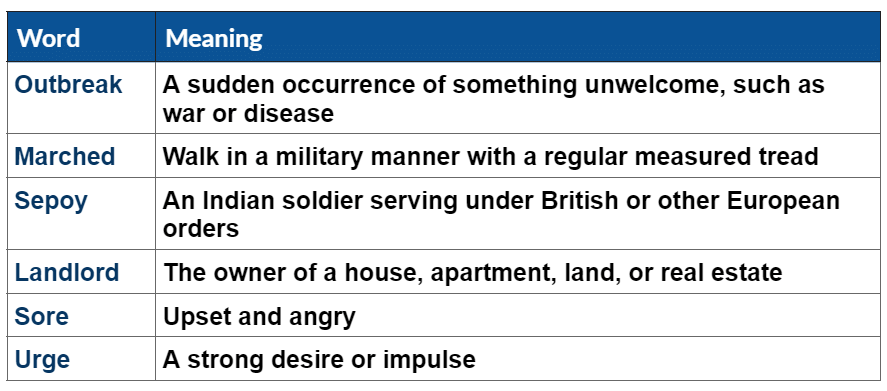
9. The Fight for Freedom (1857)
(Scene 1: Begum Hazrat Mahal at her palace)Narrator: Many former rulers like Begum Hazrat Mahal of Lucknow were bitter.
Begum Hazrat Mahal: The white man has taken away my kingdom!
Narrator: They joined the upsurge against the foreigner.
(Scene 2: A large group of people can be seen listening to Maulvi Ahmedulla of Faizabad)
Maulvi Ahmedulla: Rise, brothers, rise! The Angrez is ruining our land!
Narrator: The people rose everywhere, in Bareilly, Kanpur and Allahabad.
(Scene 3: At a palace)
Azimulla Khan: We should have Peshwa Nana Saheb as our leader in this war of independence.
Narrator: The patriots pounced upon the British and fought pitched battles all over North India.
(Scene 4: At river Ganges)
Kunwar Singh: Mother Ganga! This is my last offering to you!
Meaning of Difficult Words
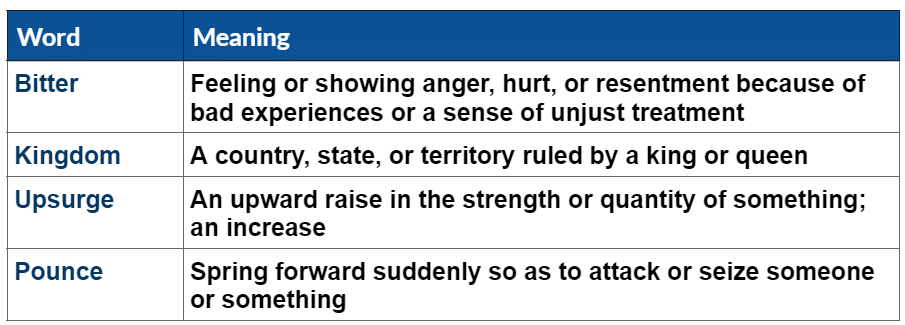
|
36 videos|330 docs|56 tests
|
FAQs on Vocabulary: Glimpses of the Past - English Class 8
| 1. What is the meaning of Martyrs? |  |
| 2. Who were the Company's conquests during 1757-1849? |  |
| 3. What was the period of British Rule in India? |  |
| 4. Who was Raja Ram Mohan Roy? |  |
| 5. What was the impact of oppression in India during 1765-1835? |  |

















